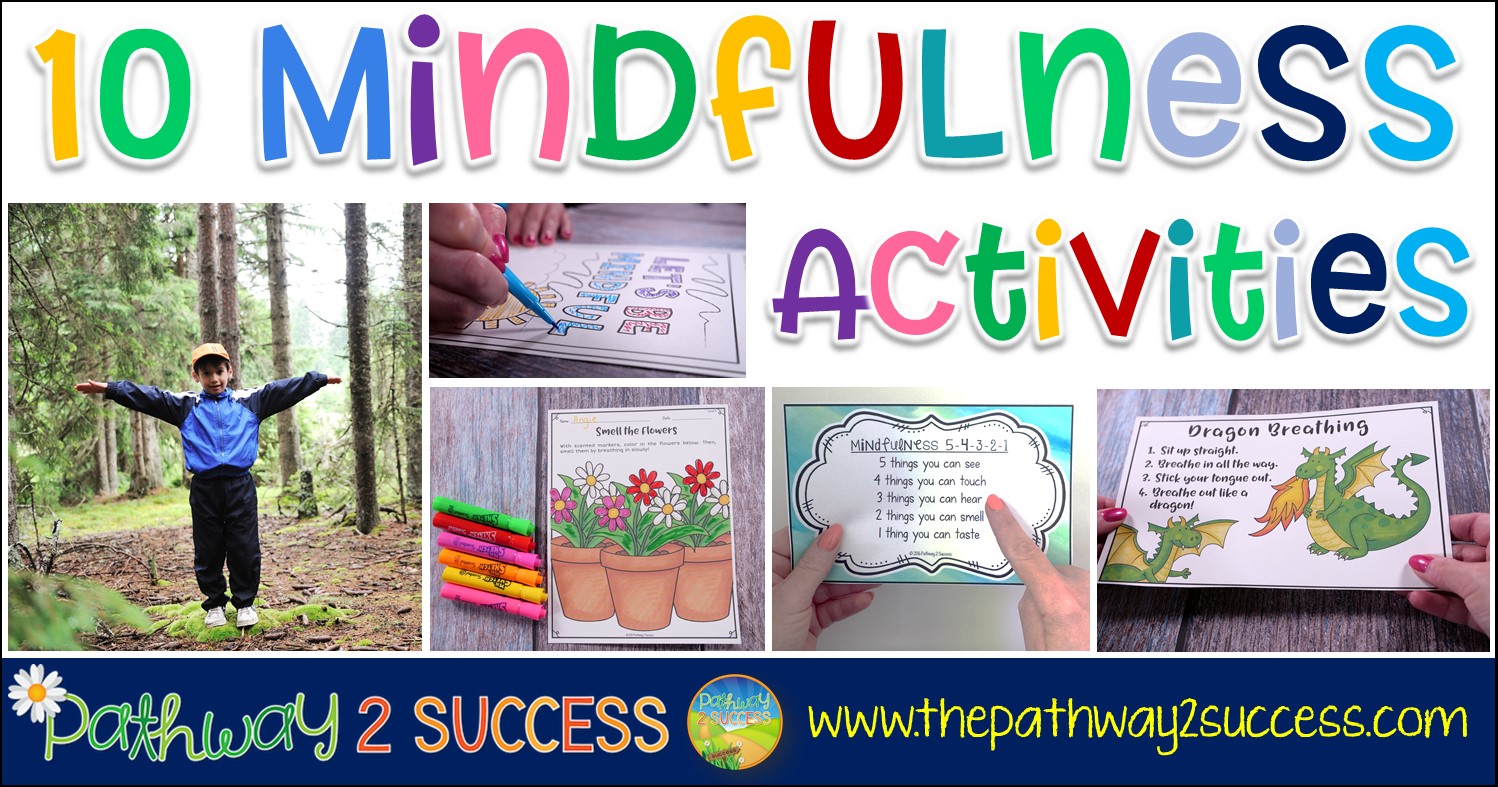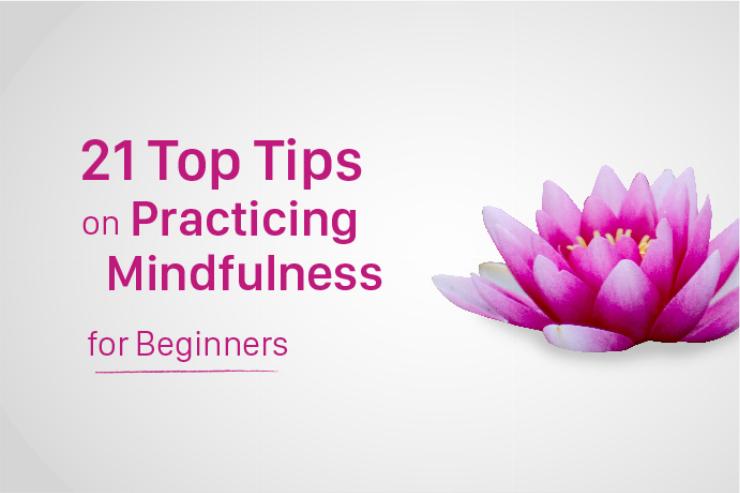
How to Practice Mindfulness: Tips and Tricks for Beginners
Written: Editor | August 16, 2023

Getting Started with Mindfulness
Becoming more mindful can have numerous benefits for your overall well-being. If you're new to mindfulness and want to incorporate it into your daily life, here are some beginner tips to get you started in the right direction.
Creating a conducive environment for mindfulness practice
-
Find a quiet space: Choose a calm, distraction-free area where you can focus on your practice without interruptions.
-
Set the mood: Use soft lighting, calming scents, or gentle music to create a relaxing atmosphere that promotes mindfulness.
-
Eliminate distractions: Turn off your phone, close unnecessary tabs on your computer, and minimize external stimuli that can draw your attention away.
Breathing techniques for beginners
-
Deep breathing: Take slow, deep breaths, focusing on the physical sensations as air enters and leaves your body.
-
Counting breaths: Inhale deeply, counting to four, hold for a moment, and then exhale, counting to four. Repeat this pattern to promote relaxation and awareness.
-
Guided breathing meditation: Use guided meditation apps or videos that provide verbal instructions for proper breathing techniques.
Mindful eating and its benefits
-
Slow down: Chew your food slowly and savor each bite. Pay attention to the taste, texture, and aroma of your food.
-
Engage your senses: Notice the colors, smells, and sounds associated with your meal. Fully immerse yourself in the experience of eating.
-
Practice gratitude: Cultivate a sense of appreciation for the food you are consuming, acknowledging the efforts that went into its preparation.
Remember, mindfulness is a journey, and it takes time and practice to develop the habit. Start small and gradually incorporate mindfulness into different aspects of your daily life for maximum benefits.

Cultivating Awareness in Daily Life
For those looking to de-stress and find moments of calmness in their busy lives, mindfulness can be a powerful tool. Mindfulness is the practice of intentionally bringing one's attention to the present moment without judgment. By focusing on the here and now, individuals can develop a greater sense of self-awareness and a deeper connection to their surroundings. Here are some beginner tips for incorporating mindfulness into daily life.
Practicing mindfulness during everyday activities
- Eating: Slow down and fully immerse yourself in the sensory experience of eating. Pay attention to the taste, texture, and smell of your food.
- Walking: Instead of rushing from one place to another, take a moment to notice the sensation of each step. Pay attention to your surroundings and engage your senses.
- Showering: Use this time to fully experience the sensation of the water on your skin, the smell of the soap, and the sound of the water.
Bringing mindfulness to work or school
- Breathing exercises: Take a few deep breaths before starting a task or during breaks. This can help bring your attention back to the present moment and calm your mind.
- Schedule mindful moments: Set reminders throughout the day to pause and check in with yourself. Take a few mindful breaths and notice how you're feeling physically and emotionally.
- Mindful transitions: Before moving from one task to another, take a moment to pause and reset your focus. This can help improve productivity and reduce stress.
Mindful communication and improved relationships
- Active listening: When engaging in conversations, be fully present and attentive. Focus on the speaker and genuinely listen without interrupting or formulating responses in your mind.
- Nonjudgmental awareness: Practice accepting others without judgment. Be aware of your own biases and preconceived notions, and approach interactions with an open mind.
- Empathy and compassion: Mindfulness can cultivate a greater sense of empathy and compassion for others. Practice putting yourself in someone else's shoes and responding with kindness and understanding.
Incorporating mindfulness into daily life takes practice, but the benefits are worth it. It can reduce stress, enhance focus, and improve overall well-being.

Overcoming Common Challenges in Mindfulness Practice
Dealing with distractions and wandering thoughts
Mindfulness is all about being present in the moment, but distractions and wandering thoughts can often get in the way. Here are some tips to help you overcome these challenges:
1.Acceptance: Instead of fighting against distractions and thoughts, acknowledge them and let them pass without judgment. Remember that it is natural for the mind to wander, and the key is to gently bring your focus back to the present moment.
2.Anchor your attention: Use a focal point, such as your breath or a specific sensation, to anchor your attention. When distractions arise, return your focus to your chosen anchor.
Managing stress and anxiety through mindfulness
Mindfulness practice can be a powerful tool to manage stress and anxiety. Here are some strategies to incorporate mindfulness into your daily life:
1.Breathing exercises: Deep breathing exercises can help activate the body's relaxation response, reducing stress and anxiety. Take slow, deep breaths and focus your attention on the sensation of your breath.
2.Body scan meditation: This practice involves systematically directing your attention to different parts of your body, noticing any sensations without judgment. It can help you become more aware of tension and release stress.
Maintaining a consistent mindfulness routine
Consistency is key when it comes to mindfulness practice. Here are a few tips to help you maintain a regular routine:
1.Schedule it: Set aside specific times for mindfulness practice each day. Treat it like any other appointment and prioritize it.
2.Start small: Begin with just a few minutes of practice each day and gradually increase the duration as you feel more comfortable.
Remember that mindfulness is a skill that takes time and practice to develop. Be patient with yourself and enjoy the journey towards a more present and mindful life.

Deepening Your Mindfulness Practice
For those new to mindfulness, incorporating the practice into your daily routine can be both exciting and challenging. However, with dedication and the right techniques, you can cultivate a deeper mindfulness practice that brings about greater peace and clarity in your life.
Exploring different meditation techniques
To further enhance your mindfulness practice, it is helpful to explore different meditation techniques. There are various forms of meditation, such as focused attention meditation, loving-kindness meditation, and body scan meditation. Each technique offers its own unique benefits and can help you develop different aspects of mindfulness. Experiment with different techniques to find the ones that resonate with you the most.
Body scan and progressive muscle relaxation
A body scan meditation involves systematically moving your attention through different parts of your body, bringing awareness to any sensations or tension. This technique can be especially helpful in promoting relaxation and releasing physical and mental stress. Progressive muscle relaxation, on the other hand, involves tensing and releasing different muscle groups to promote deep relaxation. Incorporating these techniques into your mindfulness practice can enhance your overall experience and help you become more attuned to your body and its needs.
Using mindfulness apps and resources
In today's digital age, there are numerous mindfulness apps and resources available that can support your practice, especially if you are a beginner. These apps provide guided meditations, timers, and other helpful tools to assist you in developing a consistent mindfulness routine. Some popular mindfulness apps include Headspace, Calm, and Insight Timer. Additionally, there are books, podcasts, and online courses that offer valuable insights and guidance on deepening your mindfulness practice.
Remember, deepening your mindfulness practice is a journey that requires patience and consistency. By exploring different techniques and utilizing available resources, you can continue to cultivate a meaningful and transformative mindfulness practice in your daily life.

Mindfulness and Self-Care
Using mindfulness for self-compassion and self-care
When it comes to self-care and self-compassion, mindfulness plays a crucial role. Mindfulness is the practice of being fully present and aware in the current moment without judgment. By cultivating mindfulness, individuals can develop a deeper sense of self-awareness and understanding, leading to improved feelings of self-compassion.
Mindfulness helps individuals become more attuned to their physical, emotional, and mental well-being. By paying attention to their thoughts, emotions, and bodily sensations, individuals can better recognize and respond to their needs. Practicing self-compassion through mindfulness involves treating oneself with kindness, understanding, and patience, just as one would treat a close friend in need.
Incorporating mindfulness into a daily self-care routine
Integrating mindfulness into your daily self-care routine can have numerous benefits for your overall well-being. Here are some practical tips for beginners to incorporate mindfulness into their daily lives:
-
Start with small moments: Begin by dedicating a few minutes each day to practice mindfulness. It can be as simple as focusing on your breath or savoring a moment of stillness.
-
Practice self-compassion: Be gentle with yourself as you explore mindfulness. It's okay to have wandering thoughts or challenges in focusing. Embrace the process and remind yourself that it's a journey.
-
Engage in mindful activities: Incorporate mindfulness into everyday activities like walking, eating, or even doing household chores. Pay attention to the sensations, tastes, and smells around you.
-
Use guided meditation: Explore guided meditation practices or apps designed to help you develop mindfulness skills. These can provide structure and support as you navigate your mindfulness journey.
Remember, mindfulness is a practice that requires patience and consistency. By incorporating these tips into your daily routine, you can gradually cultivate a more mindful and self-caring mindset

Mindfulness for Improved Focus and Productivity
Whether you're a busy professional, a student, or simply someone seeking greater clarity and peace of mind, incorporating mindfulness practices into your daily routine can lead to improved focus and productivity.
Applying mindfulness techniques to enhance focus and concentration
-
Start with breath awareness: Take a few moments every day to focus on your breath. Pay attention to each inhale and exhale, allowing yourself to fully experience the present moment.
-
Practice mindful meditation: Allocate dedicated time to sit quietly and engage in meditation. Choose a comfortable position, focus your attention on your breath or a specific object, and let any wandering thoughts pass without judgment.
-
Cultivate awareness throughout the day: Bring mindfulness into everyday activities such as eating, walking, or even washing dishes. Be fully present in each moment, savoring the experience without distraction.
Time management and prioritization with mindfulness
-
Set clear intentions: Begin each day by setting clear intentions for what you want to accomplish. This helps you stay focused and prioritize tasks effectively.
-
Practice single-tasking: Instead of multitasking, focus on one task at a time. Give it your full attention and complete it before moving on to the next one.
-
Take purposeful breaks: Incorporate short breaks into your schedule to relax and recharge. During these breaks, engage in activities that promote mindfulness, such as deep breathing, stretching, or walking in nature.
By incorporating these mindfulness practices into your daily routine, you can enhance your focus, improve your productivity, and experience a greater sense of clarity and well-being. Remember, mindfulness is a skill that can be developed with practice, so be patient and compassionate with yourself as you embark on this journey.

Bringing Mindfulness into Relationships
Whether you're in a romantic relationship or a parent trying to raise mindful children, incorporating mindfulness practices into your daily life can bring about positive changes and foster deeper connections.
Mindfulness in romantic relationships
Practicing mindfulness in your romantic relationship can help you cultivate a deeper level of understanding, empathy, and connection. Here are some tips to bring mindfulness into your relationship:
-
Be present: Take the time to truly listen to your partner without judgment. Pay attention to their words, body language, and emotions, creating a safe space for open and honest communication.
-
Show gratitude: Regularly express appreciation for your partner. Recognize and acknowledge their efforts, both big and small. This fosters a positive atmosphere and strengthens the bond between you.
-
Practice forgiveness: Let go of past grievances and practice forgiveness. Holding onto resentment blocks emotional intimacy. Cultivate compassion and understanding for your partner's flaws and mistakes, as you would want them to do for you.
Mindful parenting and raising mindful children
Incorporating mindfulness into parenting can create a more calm and harmonious atmosphere for both you and your children. Here are some tips to bring mindfulness into your parenting:
-
Lead by example: Children learn through observation, so cultivate your own mindfulness practice. Show them how to be present and regulate emotions by being a mindful role model.
-
Practice active listening: Create a space where your children feel heard and understood. Engage in meaningful conversations and truly listen without distractions. This builds trust and strengthens your bond.
-
Set boundaries with compassion: Establish rules and boundaries while empathizing with your children's emotions. Approach discipline with understanding and try to find teachable moments instead of resorting to punishments.
By incorporating these mindfulness practices into your relationships and parenting, you can create a more fulfilling and connected experience for both yourself and your loved ones.

Maintaining a Mindful Lifestyle
Building resilience through mindfulness
If you're new to mindfulness or looking to incorporate it into your daily routine, here are some beginner tips to get started!
-
Start small: Begin by setting aside just a few minutes each day to practice mindfulness. This could be through meditation, deep breathing exercises, or simply focusing your attention on the present moment.
-
Practice gratitude: Take time each day to reflect on the things you are grateful for. This can help shift your focus away from negative thoughts and promote a more positive mindset.
-
Be present: Mindfulness is all about being fully present in the here and now. Pay attention to your surroundings, listen to your body, and engage in activities with full awareness.
-
Observe your thoughts: Rather than getting caught up in your thoughts and emotions, try to observe them non-judgmentally. This can help you develop a sense of detachment and reduce stress or anxiety.
-
Practice self-compassion: Treat yourself with kindness and understanding. Be gentle with yourself when facing challenges and acknowledge that everyone experiences ups and downs.
-
Find a supportive community: Connect with others who are also interested in mindfulness. Join a meditation group, attend workshops, or find online communities where you can share experiences and learn from one another.
-
Be consistent: Like any habit, consistency is key. Try to incorporate mindfulness into your daily routine and make it a priority.
Remember, mindfulness is not about achieving perfection or eliminating all thoughts. It's about cultivating awareness, being kind to yourself, and living in the present moment. Start small, be patient with yourself, and enjoy the journey towards a more mindful lifestyle.



